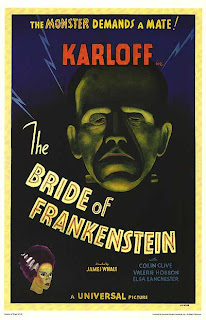Brian Bara (aka Prospero), proprietor of the fabulous Caliban’s Revenge was kind enough to supply today's posting for Gay Pride Month. Submitted for your approval, here is a piece on one of gay horror's ground-breakers, Frankenstein's Gay Daddy, James Whale:
As a child in the 60’s, my first introductions to horror movies were the Universal Monsters films on UHF TV. You know you know them: Dracula; Frankenstein; The Wolfman. -- movies my father loved and saw on the big screen when he was a kid. But my favorite was Bride of Frankenstein, now considered to be director James Whale’s masterpiece.
Openly gay James Whale's directing career started as WWI POW, directing plays and skits in order to maintain morale amongst his fellow POWs. After the war, he returned to England and took up a career as a cartoonist before returning to the stage with a production of Journey's End, a play about WWI. He subsequently went on to make Journey's End into a film in 1930, starring frequent collaborator (and rumored homosexual) Colin Clive, who later gained fame as Dr. Henry Frankenstein, maker of monsters. Whale made two more WWI films that year, Hell's Angels and Waterloo Bridge.
The following year, he made the first of many film adaptations of Mary Shelley's classic Horror novel Frankenstein, starring Clive and Boris Karloff as the Monster (a role Bela Lugosi turned down because he thought he'd be unrecognizable under so much makeup). The film was sensation and like Tod Browning's Dracula, caused women to faint in the aisles.
Whale's next foray into the genre was 1932's The Old Dark House, starring Karloff, Melvyn Douglas, Charles Laughton and Gloria Stuart. It tells the story of a group of travelers seeking shelter from a storm in a gloomy castle in Wales, and is probably the primary inspiration for The Rocky Horror Show. In 1933, Whale's tackled H.G. Welles' The Invisible Man, starring Claude Rains and Ms. Stuart as his ill-fated love, which also featured familiar character actress and hysterical screamer Una O'Connor in one of her many appearances in a Whale film. Sadly, Whale's next genre film would be both his best and his last. 1935's Bride of Frankenstein would reunite him with Colin Clive and Boris Karloff, but would be the last time Whale visited the genre. It is also one of the best genre films of the era, made at the height of Whale's artistic prowess.
 Filled with in-jokes, camp performances, furtive gay references and then state-of-the-art special effects, Bride of Frankenstein actually made the monster a sympathetic character this time around. Hated and misunderstood because he was different, the creature learns to speak (thanks to a kindly blind hermit) and eventually expresses his loneliness. Of course when Frankenstein and his collaborator Dr. Pretorius (Ernest Thesiger) finally create a mate (Elsa Lanchester) for him, she rejects the monster who then declares “We belong dead!” and promptly blows the lab (and his ‘bride’) to smithereens. Sadly, “We belong dead!” was probably the prevailing attitude among gay people in the 30’s. Even sadder, it’s still the attitude among many straight people, today.
Filled with in-jokes, camp performances, furtive gay references and then state-of-the-art special effects, Bride of Frankenstein actually made the monster a sympathetic character this time around. Hated and misunderstood because he was different, the creature learns to speak (thanks to a kindly blind hermit) and eventually expresses his loneliness. Of course when Frankenstein and his collaborator Dr. Pretorius (Ernest Thesiger) finally create a mate (Elsa Lanchester) for him, she rejects the monster who then declares “We belong dead!” and promptly blows the lab (and his ‘bride’) to smithereens. Sadly, “We belong dead!” was probably the prevailing attitude among gay people in the 30’s. Even sadder, it’s still the attitude among many straight people, today. Whale went on to make several dramas and romances, including the first version of Jerome Kerns' musical Showboat with Irene Dunne, Paul Robeson and Hattie McDaniel. He lived with his partner David Lewis for 22 years, until they separated in 1952. By then, Hollywood homophobia had ended his career as a filmmaker, though he had rediscovered his love of painting. His later life was fictionalized in Bill Condon’s brilliant 1998 film Gods and Monsters, starring Ian Mckellan, Brendan Fraser and Lynn Redgrave. Whale drowned himself in his swimming pool in 1957.
James Whale made 22 films over his career, but is best remembered for his astonishing genre films, which have rightfully earned the title "Classic." Whale was openly gay at a time when being so often meant the end of one's career but his artistic vision was so strong, it transcended sexuality and affected audiences worldwide and for generations to come. I fear we will not see his like again, though I pray I am wrong.
Prospero
*Portions of this post first appeared on Caliban’s Revenge in October of 2010.


1 comment:
Very well researched biography of a very great man.
Excellent post.
Post a Comment